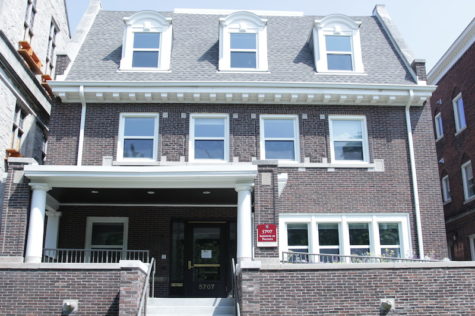Booth Professor Douglas Diamond Wins Nobel Prize in Economics for Seminal Work in Finance Research
Diamond was named a Nobel Laureate for research on banking systems alongside Philip Dybvig and Ben Bernanke
Looking across the Midway towards Woodlawn Residential Commons and the Rubenstein Forum.
October 11, 2022
A bolt of Swedish excitement struck campus Monday morning when Douglas Diamond, the Merton H. Miller Distinguished Service Professor of Finance at the University of Chicago Booth School of Business, was awarded the Sveriges Riksbank Prize in Economic Sciences in Memory of Alfred Nobel 2022.
Diamond received the prize jointly with Philip Dybvig of Washington University of St. Louis and Ben Bernanke, former chair of the Federal Reserve, for research in the 1980s that modeled the role of banks in financial crises.
University President Paul Alivisatos joined Diamond and Booth School Dean, Madhav Rajan, for a press conference at the Rubenstein Forum on Monday, October 10.
“Today, we are all delighted and—I am especially so—to see [Diamond] celebrated on the world stage for his amazing scholarly contributions,” Alivisatos told the assembled press. “This Nobel is a richly deserved honor.”
Diamond took his speaking time at the conference to thank the University of Chicago colleagues, including previous Nobel laureates Eugene Fama and Merton Miller, who helped him develop and refine his research.
“My work was subjected to very careful and detailed comments by all of my colleagues, and it forced me to really think clearly about what I was doing and whether it made any sense,” Diamond said.
He added that sharing the Business School offices in Rosenwald Hall with colleagues like Fama, whose background was in empirical research, helped to challenge his own focus on theory. He said that the diversity of academic perspectives made the University of Chicago an ideal place for his research.
At Monday’s press conference, Rajan reflected on the influence of Diamond’s research. “His research agenda for the past 40 years has been to explain what banks do, why they do it, and the consequences of those arrangements,” Rajan said. “[His] groundbreaking ideas literally created modern banking theory.”
Diamond has researched and taught at the Booth School, formerly the University of Chicago School of Business, since 1979. He received his Ph.D. in economics from Yale University in 1980.
The Nobel Committee for the Prize in Economic Sciences cited two of Diamond’s papers as the basis for this year’s award. “Financial Intermediation and Delegated Monitoring,” published in 1984, rose out of Diamond’s doctoral research at Yale.
“Bank Runs, Deposit Insurance, and Liquidity,” published with Nobel co-laureate Dybvig in 1983, proposed a highly influential model for understanding what leads to and produces bank runs. The model is now known as the Diamond–Dybvig model.
Diamond was asked on Monday if he harbored any bad feelings about the nearly 40-year gap between the publication of the recognized papers and the Nobel Committee’s decision.
“You don’t want to win it too young, right?” Diamond joked. “It sort of goes to your head and things like that. So I’m just glad they didn’t wait until I was well past my last sale date.”













